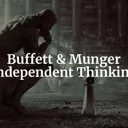Tags: Charlie Munger
This fanpage is not officially affiliated with Berkshire Hathaway: Disclaimer
Discover the transformative power of inversion, a timeless principle championed by Charlie Munger and rooted in the wisdom of Carl Gustav Jacob Jacobi. This article explores how avoiding pitfalls in investing, economic policy, and corporate strategy can lead to success. If you're not interested in discovering why inversion is such a powerful tool, then feel free to stop reading directly!

Introduction
In the world of business and investment, where complexity often reigns supreme, the simple yet profound principle of "Invert, always invert" emerges as a beacon of clarity. This concept, originally attributed to the German mathematician Carl Gustav Jacob Jacobi, has been popularized in modern times by Charlie Munger ↗↗, former Vice Chairman of Berkshire Hathaway and a long-time business partner of Warren Buffett. Munger's application of inversion as a mental model has not only shaped his own investment philosophy but has also significantly influenced Buffett's approach to investing 15.
Inversion, as a mental model, encourages us to think about problems from both forward and backward perspectives. It is a tool that allows us to explore different angles, identify potential pitfalls, and ultimately make more informed decisions. Munger famously quipped, “All I want to know is where I’m going to die, so I’ll never go there,” underscoring the practical wisdom of avoiding obvious mistakes rather than striving for brilliance 5. This approach is not only applicable in investing but also extends to various domains, including economic policy and corporate strategy.
The historical roots of inversion can be traced back to both mathematics and philosophy. The Stoic philosophers, such as Marcus Aurelius and Seneca, practiced premeditatio malorum, or the premeditation of evils, by envisioning worst-case scenarios to overcome fears and improve planning 6. This philosophical exercise parallels the mathematical inversion advocated by Jacobi, who believed that many hard problems are best solved when addressed backward.
In this article, we aim to provide a comprehensive and entertaining exploration of inversion as a powerful cognitive tool. We will delve into its application across different domains, including Argentina's economic challenges, poor investment strategies, and IBM's corporate turnaround. By examining these examples, we will illustrate how inversion can lead to better decision-making and improved outcomes.
The Origins of Inversion: Carl Gustav Jacob Jacobi
Carl Gustav Jacob Jacobi was a pioneering German mathematician whose work spanned a broad array of mathematical fields, including elliptic functions, dynamics, differential equations, and number theory 7. Born in 1804 in Potsdam, Jacobi's intellectual journey began at a young age, and he quickly advanced through the academic ranks. His contributions to mathematics were profound, but perhaps his most enduring legacy is his advocacy for the principle of inversion, encapsulated in the phrase "man muss immer umkehren" or "invert, always invert" 5.
Jacobi's influence on mathematical problem-solving is significant, particularly through his work on elliptic functions and the Jacobi identity, which remains a cornerstone in various mathematical disciplines 7. His approach to inversion was not merely a mathematical technique but a broader intellectual strategy that encouraged thinkers to consider problems from multiple perspectives. This principle of inversion has resonated through the ages, finding a modern champion in Charlie Munger, who frequently referenced Jacobi's inversion principle as a key element of his own thinking 5.
Jacobi's life was as dynamic as his mathematical contributions. He pursued an academic career with vigor, becoming a tenured professor at Königsberg University and later moving to Berlin, where he lived as a royal pensioner until his death in 1851 7. His political involvement during the Revolution of 1848 and his unsuccessful run for parliament reflect a man engaged with the world beyond the confines of academia.
Beyond his mathematical achievements, Jacobi made significant contributions to number theory, celestial mechanics, and differential equations, showcasing his intellectual versatility 7. His work laid the groundwork for future developments in these fields, and his legacy is honored by the naming of a lunar crater, Jacobi, after him 7. Through his principle of inversion, Jacobi has left an indelible mark on both mathematics and the broader realm of strategic thinking, influencing generations of thinkers, including the likes of Munger and Buffett.
It would have been great to see Munger and Jacobi interact. It might have gone like this:
In a sunlit conference room, Carl Gustav Jacob Jacobi, dressed in his 19th-century frock coat, faced Charlie Munger, who leaned forward with his signature spectacles and an amused grin. On the table lay a shared problem: How to ensure the success of a global literacy fund?
Munger broke the silence. “Professor Jacobi, your idea of ‘Invert, always invert’—let’s start there. How do we guarantee failure?”
Jacobi, his Prussian accent sharp, responded with a smile. “Failure, Herr Munger? Spend extravagantly on administration, ignore data, and dismiss cultural contexts.”
“Add to that: hire incompetent leaders and overpromise,” Munger added, tapping his cane. “Avoiding stupidity is often the shortest route to brilliance.”
Jacobi nodded, impressed. “Inversion transforms chaos into clarity. When I faced unsolvable problems, I reversed them to reveal simplicity.”
Munger chuckled. “Inversion simplifies life too—investing, decision-making, even philanthropy. Avoid stupidity, and success often takes care of itself.”
As the two parted ways, they shared a mutual respect for the universal power of their principle. Across centuries, inversion remained the key to understanding—and avoiding—failure.
Anyways, let's come back to the real world and apply inversion to some examples.
Inversion in Investing: Avoiding Stupidity
In the world of investing, the concept of inversion serves as a guiding principle for avoiding common pitfalls. Charlie Munger has effectively applied this mental model to the realm of investing. Munger's philosophy is straightforward: avoiding stupidity is easier than seeking brilliance. This approach has been instrumental in shaping the investment strategies at Berkshire Hathaway, where Munger and Warren Buffett prioritize long-term investments and a disciplined focus on fundamentals 5.
One of the key areas where inversion proves invaluable is in understanding the underperformance of average investors. According to research by Dalbar, the average equity fund investor lagged behind global equity indices by over 3% annualized over a 20-year period ending December 31, 2020 3. This underperformance highlights the importance of avoiding common mistakes, such as high fees and taxes, which can significantly erode investment returns. For instance, a $1 Million portfolio with 1% fees grows over $300,000 less than one with 0.5% fees over 20 years at a 7% gross return. This stark difference underscores the need for investors to be vigilant about fee structures and tax implications 3.
Another common misstep is the temptation of market timing—the belief that one can consistently predict market highs and lows to maximize returns. However, successful market timing requires being right twice: exiting near the top and re-entering near the bottom. As history and research have shown, consistently profiting from market timing is nearly impossible, as any reliable signals would quickly be exploited and lose their effectiveness 3. Instead, Warren Buffett advises that "inactivity is usually the best investment decision," reinforcing the inversion principle by suggesting that doing less often yields better results 3.
The dangers of manager switching further illustrate the benefits of inversion. Studies, such as those conducted by Emory and Arizona State University, reveal that pension plans chasing returns by firing underperforming managers and hiring outperformers often do not profit. In fact, fired managers frequently deliver better returns than their replacements. This pattern highlights the importance of maintaining a long-term perspective and avoiding emotional reactions to short-term performance fluctuations 3.
Munger's perspective on investing aligns with this long-term focus. He emphasizes the importance of avoiding emotional reactions to stock price changes and maintaining objectivity in decision-making. By concentrating on a few great investments and holding them, investors can minimize transaction costs and taxes, ultimately benefiting from the power of compound interest 8. This approach not only aligns with the principles of inversion but also serves as a testament to the timeless wisdom of avoiding stupidity in investing.
While inversion in investing often yields private benefits, failing to apply this principle on a state level can lead to catastrophic consequences. Let’s explore a striking example where an entire nation seemed to ask, either consciously or unconsciously, the question: "What steps can we take to ensure misery?"
Argentina's Economic Woes: A Case of Inverted Policy
Pre-Milei's Argentina's economic crisis serves as a cautionary tale of what to avoid in national economic policy. The country's struggles are characterized by high inflation, excessive government spending, and a pervasive lack of trust in policymakers. These factors had created a perfect storm, leading to an annual inflation rate exceeding 100%, the third-highest in the world after Venezuela and Lebanon 2.
The International Monetary Fund (IMF) has been involved with Argentina for decades, providing billions of dollars in loans without successfully stabilizing the economy. The IMF's history with Argentina is marked by a series of failed attempts to implement necessary reforms, such as controlling spending and reforming the inefficient tax system. Political issues and a lack of cooperation have hindered these efforts, leaving Argentina in a perpetual state of economic turmoil 2.
A critical factor contributing to Argentina's woes was the lack of trust in the peso, which lead citizens to exchange pesos for dollars immediately upon receipt. This dollarization exacerbates the depreciation of the peso and increased inflationary pressures. Moreover, the Argentine government's long-standing issue of excessive spending further compounds the problem, leading to negative expectations regarding inflation and fiscal policy 2.
To illustrate Argentina's challenges, consider the following key economic indicators as of 2023:
| Economic Indicator | Value (Pre-Milei) | Notes |
|---|---|---|
| Inflation Rate | Over 100% | Argentina experienced hyperinflation, eroding purchasing power and savings. |
| Fiscal Deficit | Significant | Substantial fiscal deficits contributed to economic instability and limited government spending capabilities. |
| GDP Growth | Declining | The economy was contracting, with GDP declining before Milei took office, indicating a recessionary trend. |
| Poverty Rate | Over 50% | More than half of the population lived below the poverty line, exacerbated by inflation and unemployment. |
| Unemployment Rate | High | Unemployment rates were elevated, reflecting economic stagnation and limited job creation. |
| Foreign Reserves | Low | The central bank's foreign reserves were depleted, affecting the country's ability to manage currency stability and external debt. |
| Public Debt | Elevated | Argentina's public debt levels were high, raising concerns about debt sustainability and repayment obligations. |
| Currency Exchange Rate | Volatile | The Argentine peso experienced significant volatility and depreciation, impacting import costs and inflation. |
| Interest Rates | Elevated | To combat inflation, interest rates were raised, which hindered economic growth and investment. |
| Investment Climate | Unfavorable | Economic instability and policy uncertainties led to reduced foreign and domestic investment. |
These figures paint a stark picture of an economy in distress, struggling under the weight of ineffective policies and political polarization. The autonomy of Argentina's provinces complicates central government control over fiscal spending, creating additional barriers to effective management 2.
In contrast, successful cases of resolving hyperinflation in the region, such as Brazil's reforms in the mid-'90s, offer valuable lessons. Brazil's deep financial, monetary, and currency reforms required cooperation across political parties and a commitment to meaningful change. For Argentina to achieve similar success, political agreement and cooperation are essential. Without these elements, effective action remains elusive, even amid a deep crisis 2. The country's recent pivot toward a potentially prosperous future, driven by libertarian measures, suggests that Milei has taken bold and decisive steps to dramatically invert Argentina's trajectory in record time 9.
Nevertheless, the case of Argentina underscores the importance of inversion in economic policy—understanding what to avoid can be as crucial as knowing what to pursue. By learning from past mistakes and prioritizing political cooperation, Argentina can begin to chart a path toward stability and prosperity.
Let's dive into another example that has made its way into United States corporate history.
IBM's Corporate Turnaround: Inversion in Action
In the early 1990s, IBM found itself in dire straits, grappling with an $8 billion loss in 1993 and a plummeting stock price that had fallen from $43 in 1987 to a mere $12. The outlook was bleak, with industry insiders predicting IBM's irrelevance and potential demise. Enter Louis V. Gerstner Jr., a leader whose application of inversion principles would become the cornerstone of one of the most remarkable corporate turnarounds in history.
Gerstner's decision to keep IBM intact was pivotal. While plans were underway to dismantle the company into smaller entities, Gerstner saw potential in IBM's ability to serve as an integrator for its customers. This decision, which he described as "the most important decision I ever made – not just at IBM, but in my entire business career," exemplified the inversion principle of considering the opposite of conventional wisdom 4.
Gerstner recognized that IBM's issue was not its product but its pricing strategy. By requesting a price reduction plan within two weeks of his arrival, he inverted the traditional focus on product development to address the fundamental barrier to sales. Furthermore, he shifted IBM's focus from hardware to computing services, committing the company to open standards that allowed IBM products to be used by competitors and vice versa 4.
Hence, instead of continuing to focus solely on building better hardware (the obvious strategy), IBM inverted the problem:
- What if we don’t just improve our hardware?
They realized they couldn’t outpace competitors like Dell or Compaq by hardware innovation alone.
- What if we redefine the value we provide?
They asked, "What do customers truly need that we can offer better than anyone else?"
This shift in perspective towards the value added for the customer not only expanded IBM's market reach but also positioned it as a leader in the burgeoning services sector.
A significant part of Gerstner's strategy further involved cultural change. Upon his arrival, he found a culture mired in internal conflicts, with units competing rather than collaborating. By abolishing the company's rigid dress code and overhauling the compensation system to reward total corporate performance, Gerstner fostered an environment of openness and cooperation 4. His efforts to communicate regularly with employees through emails and his willingness to bypass hierarchical barriers demonstrated his commitment to cultural transformation.
The results of Gerstner's inversion-driven strategy were profound. IBM's financial performance improved dramatically, as evidenced by the following table:
| Metric | Before Gerstner (1993) | After Gerstner (2002) |
|---|---|---|
| Annual Loss | $8 billion | Profit of $8 billion |
| Stock Price | $12 | >100$ |
| Mainframe Sales Dependency | Over 90% | Diversified Revenue |
Gerstner's legacy as an "elephant trainer" who demonstrated IBM's ability to recover from a significant deficit is a testament to the power of inversion in corporate strategy 4. By challenging the status quo and focusing on what to avoid rather than what to pursue, Gerstner turned IBM's fortunes around, leaving an indelible mark on the business world.
You might be wondering: Why does inversion help us as a concept? What makes it so effective in finding solutions more easily? As Charlie Munger has emphasized repeatedly, we must draw on models from various fields 1. In this case, inversion is rooted more in psychology than in mathematics.
The Psychological and Philosophical Roots of Inversion
The concept of inversion is deeply rooted in both psychological and philosophical traditions, offering a counterintuitive yet powerful approach to problem-solving and decision-making. The Stoic philosophers ↗, including Marcus Aurelius, Seneca, and Epictetus, practiced an exercise known as premeditatio malorum, or "premeditation of evils." This exercise involved envisioning worst-case scenarios to overcome fears and improve planning for potential failures 6.
Inversion, as a mental exercise, encourages individuals to consider the opposite of what they desire. By envisioning negative outcomes, one can identify potential roadblocks and errors that may not be immediately apparent. This approach is particularly effective in counteracting confirmation bias, allowing for a more comprehensive evaluation of situations from different perspectives 6.
The application of inversion extends beyond personal decision-making to various contexts, including innovation, marketing, and personal finance. For instance, leaders can improve by asking themselves, "What would someone do each day if they were a terrible manager?" to identify behaviors to avoid. Similarly, marketing departments can gain insights by questioning, "What would alienate our core customer?" 6.
Inversion also plays a crucial role in art and writing, where breaking previous rules often leads to creative breakthroughs. The Failure Premortem exercise, which involves imagining a project's failure and narrating how it happened, is another example of inversion in practice. This technique helps identify potential points of failure, enabling proactive measures to prevent them 6.
Despite its counterintuitive nature, inversion is a tool used by great thinkers and leaders to challenge beliefs and decisions. By considering the opposite of what one wants, akin to a jury hearing both sides of an argument, inversion provides a unique lens through which to view challenges and opportunities. As such, it remains a timeless strategy for navigating the complexities of life and business 6.
Of course, this article needs to include a brief discussion on how inversion has influenced Berkshire Hathaway, particularly in the context of the dynamic between Warren Buffett and Charlie Munger. We could argue that this very principle has played a pivotal role in their successful collaboration. Let's have a look:
Munger and Buffett: A Partnership Built on Inversion
The partnership between Charlie Munger and Warren Buffett was a testament to the power of collaboration and the profound impact of inversion thinking. Munger, often described as a "curmudgeon" and "the quintessential realist," has played a pivotal role in transforming Buffett's investment philosophy. Before Munger's influence, Buffett adhered strictly to the Graham & Dodd value investing approach, which focused on buying undervalued stocks and selling them once they appreciated. However, Munger's introduction of the concept of "one decision growth stocks" marked a significant shift in Berkshire Hathaway's strategy, allowing the company to move beyond the constraints of deep discount value investing 8.
This evolution in strategy is evident in Berkshire's investments in companies like Coca-Cola and American Express, as well as subsidiaries such as See’s Candies ↗ and GEICO ↗. By focusing on buying and holding stocks with strong franchises, Berkshire has been able to capitalize on compound interest, turning these investments into long-term profit machines. For instance, Coca-Cola, which was not considered cheap when first purchased in 1988, has appreciated by nearly 600%, yielding a compound annual return of approximately 25% 8.
A key strategic innovation introduced by Munger is the use of "float" from insurance premiums to magnify portfolio returns. This approach, which began with the acquisition of two small Omaha insurance companies in 1967, has allowed Berkshire Hathaway to leverage its investments effectively. The float, described by Buffett as a "very significant asset," includes super catastrophe (super cat) policies that manage risk for other insurers. This innovative use of float has been instrumental in Berkshire's success, providing a stable source of capital to fuel further investments 8.
Munger's role as a skeptic and devil's advocate in investment decision-making was another critical aspect of their partnership. He complemented Buffett's modest and folksy demeanor with his immense opinion and willingness to challenge assumptions. This dynamic ensures that investment choices are made with rigorous analysis and objectivity, stripping away emotions and subjective elements. Munger's emphasis on objectivity was reflected in their avoidance of emotional reactions to stock price changes, a discipline that has served them well in navigating market volatility 8.
Beyond his contributions to investment strategy, Munger's diverse interests and philosophical insights have profoundly influenced Buffett's success. Munger, inspired by the life of Benjamin Franklin, diversifies his interests and encourages a holistic approach to life and business. His advocacy for reducing security trading and his candid views on the investment management industry highlight his commitment to improving the broader economic landscape. Munger once suggested that reducing security trading in America by 80% would enhance civilization, and he proposed a 100% tax on gains from securities trading held for less than a year 8.
In essence, the partnership between Munger and Buffett was a powerful illustration of the timeless wisdom of inversion. By focusing on avoiding stupidity rather than seeking brilliance, they have crafted an investment philosophy that emphasizes simplicity, patience, and the power of compound interest. This approach, rooted in objectivity and collaboration, continues to guide Berkshire Hathaway's success and serves as an enduring legacy for shareholders and investors worldwide.

Conclusion
The principle of inversion serves as a powerful cognitive tool that transcends the boundaries of investment, economic policy, and corporate strategy. By encouraging us to think backward and consider what to avoid, inversion provides a framework for making more informed decisions and sidestepping common pitfalls. The insights drawn from the teachings of Carl Gustav Jacob Jacobi, as popularized by Charlie Munger, highlight the timeless relevance of this approach in navigating the complexities of the modern world.
The diverse applications of inversion are evident in the realm of investing, where Munger and Buffett have effectively utilized this principle to avoid the traps of emotional decision-making, market timing, and excessive trading. Their success at Berkshire Hathaway underscores the importance of a long-term focus and the avoidance of mistakes, reinforcing that sometimes, the path to success lies not in seeking brilliance but in steering clear of stupidity. The examples of Argentina's economic challenges and IBM's corporate turnaround further illustrate how inversion can guide policymakers and business leaders alike in crafting strategies that prioritize stability and growth.
As shareholders of Berkshire Hathaway, we are reminded of the enduring influence of Jacobi's inversion principle on Munger's investment philosophy and its ripple effects across various domains. Embracing this mindset can empower us to enhance our decision-making processes, both personally and professionally. By reflecting on what we should avoid and learning from past failures, we can carve out a path to success that is both sustainable and rewarding.
We encourage you to apply the principles of inversion in your own investment strategies, recognizing the value of patience, objectivity, and long-term thinking. Thank you for your engagement with this exploration of inversion, and we invite you to delve deeper into additional resources on this topic to further enrich your understanding and application of this timeless wisdom. By harnessing the power of inversion, we can all aspire to make better decisions that lead to fruitful outcomes in our endeavors.
References
-
Charlie Munger: "Poor Charlie’s Almanack: The Essential Wit and Wisdom of Charles T. Munger", Stripe Press 4th edition 2024 ↩↩
-
How Argentina's economy crumbled - Marketplace - www.marketplace.org ↩↩↩↩↩
-
Lou Gerstner’s Turnaround Tales at IBM - knowledge.wharton.upenn.edu ↩↩↩↩
-
Inversion and The Power of Avoiding Stupidity - fs.blog ↩↩↩↩↩
-
Inversion: The Crucial Thinking Skill Nobody Ever Taught You - jamesclear.com ↩↩↩↩↩↩
-
https://en.wikipedia.org/wiki/Carl_Gustav_Jacob_Jacobi - en.wikipedia.org ↩↩↩↩↩
-
The Day Charlie Munger Was Introduced To The World - www.forbes.com ↩↩↩↩↩↩
-
Stung by high prices, Argentines seek cheaper Nikes, Big Macs abroad - www.reuters.com ↩












